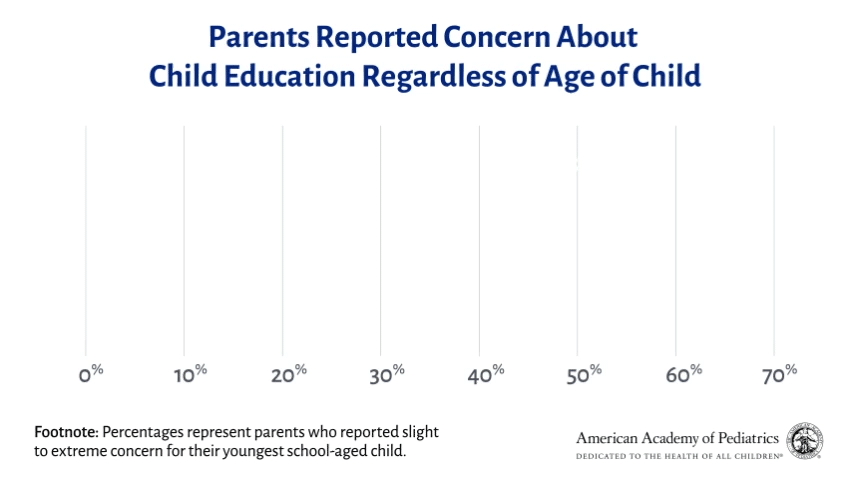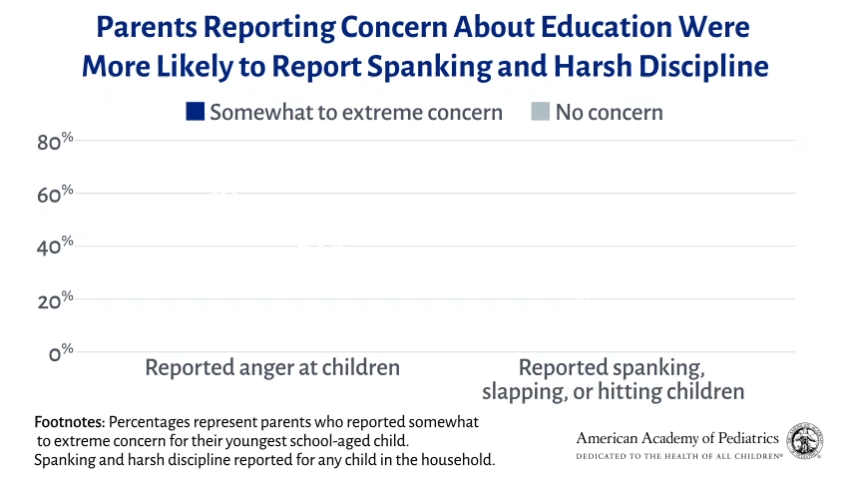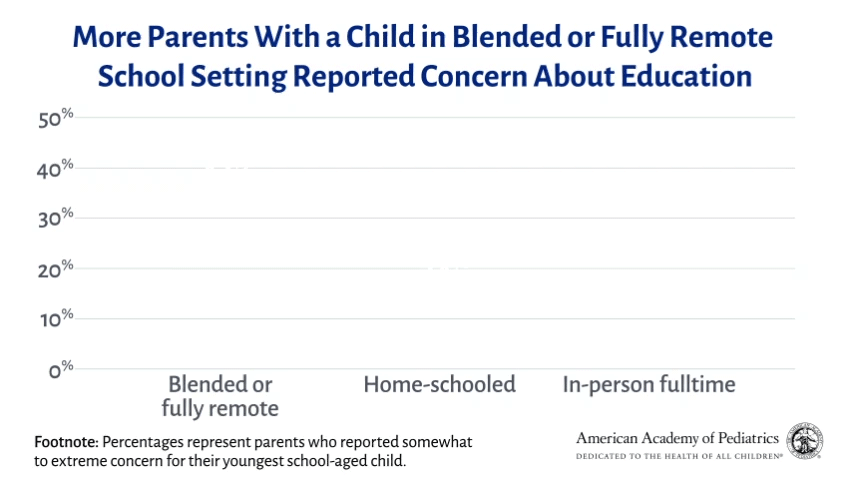Parents know their children best, and many are concerned that their children have fallen behind in school during the pandemic. These concerns can result in increased household stress – but may open opportunities to create positive family experiences as parents support children in their learning experiences. The Family Snapshot Survey explored these concerns, asking 3000 US parents in March 2021, just as some school districts were re-opening, about their thoughts concerning their youngest school-aged child’s education.
Key messages
- Over half of US parents surveyed are concerned that their youngest school-aged child has fallen behind in school, especially parents whose child’s school arrangement was blended or fully remote.
- Parents who reported certain household problems – including negative financial impact, no daily routines for their children, and experience of intimate partner violence (IPV) – were concerned that their child was falling behind in school at a higher rate than those not experiencing these problems. Pediatricians and pediatric health care providers may want to consider finding out about other household challenges when addressing parents’ concerns about their child’s education.
- Parental concern about their youngest school-aged child falling behind in school was associated with spanking and feeling angry at their children. Pediatricians and pediatric health care providers might inquire about parental view of children’s education, discuss how parents are dealing with concerns, and connect families with relevant resources.
About half (54%) of US parents of children over 5 years old surveyed worry that their youngest school-aged child fell behind in school during the pandemic, including over a third of parents who are somewhat to extremely concerned. Parents of all races and ethnicities shared these concerns; 30% to 40% of people were concerned across races/ethnicities.
Regardless of the age group of their youngest school-aged child, just over half of parents had any concerns at all that their child was falling behind at school: 51% of parents whose youngest child was 5 to 9 years of age, 58% of parents whose child was 10 to 14 years of age, and 53% of parents whose child was 15 years or older. About one-third said that they were somewhat to extremely concerned: 35% of parents whose youngest child was 5 to 9 years of age, 37% of parents whose child was 10 to 14 years of age, and 35% of parents whose child was 15 years or older.

Concerns associated with anger and violence in the home
Parents who were concerned that their youngest school-aged child was falling behind also reported that they felt angry with their children in the past 7 days. Seven of 10 parents (70%) who were somewhat or extremely concerned that their child was falling behind in school reported that they had felt angry at their children in the past week, compared with about half (54%) of those who were not concerned.
This same pattern was observed when parents were asked if they spanked, slapped, or hit their children: 22% of parents who were somewhat to extremely concerned about their youngest school-aged child falling behind in school reported spanking, slapping, or hitting their children compared with 10% of those who reported no concern; although the survey question did not specify which child was spanked. Half of parents (50%) who reported IPV (physical, emotional, or both) were somewhat to extremely concerned that their child was falling behind in school, compared with 30% of parents who did not report IPV.

Parental concern and involvement with schooling
Regardless of parents’ concerns, almost all children did have opportunities to have fun at least once a week. Parents joined their children in various activities including educational activities, media viewing, and outdoor activities, regardless of level of concern for their youngest school-aged child.
As reported in an earlier snapshot, many parents found that the experience of helping children with their education has been both a positive experience that brought them closer and a stressful experience that resulted in increased tension at home.
The quality of parental experience helping with their children’s education was associated with their level of concern that their youngest school-aged child was falling behind. Parents who reported extreme concern that their youngest school-aged child was falling behind at school reported stress and tension helping children with schoolwork more often than parents who reported no concern (69% vs 35%). The reverse was also true: parents who reported no concern were more likely to report positive experience helping children with schoolwork compared with parents who reported extreme concern (63% vs 49%).
The level of parental concern that their youngest school-aged child was falling behind varied by school setting. Parents whose youngest school-aged child was homeschooled or attended school in-person full-time were less concerned that their child was falling behind than parents whose child learned in blended or fully remote school settings. Forty three percent of parents who reported that their child’s school arrangement was blended or fully remote were somewhat to extremely concerned that their child was falling behind, compared with 24% of parents whose child was home-schooled and 28% whose child attended school in-person full-time.

Household conditions and parental concern
Parents (41%) for whom the pandemic negatively affected their family’s finances reported being somewhat to extremely concerned that their child had fallen behind in school more frequently than did those with no financial impact (34%) or a positive impact (32%).
Work factors were associated with reported concerns about children falling behind in school. One in 5 (20%) of those who initiated a change in employment themselves were extremely concerned that their child was falling behind in school compared with 10% of those who had no change in employment and 14% of those who worked less because of employer decisions. A slightly higher proportion of those who teleworked had moderate to extreme concern (38%) than those who did not (31%).
School and work patterns changed virtually overnight when the pandemic hit, and parents tried to develop new routines for their children. More parents who reported that their youngest school-aged child did not have established daily routines had concerns about their child falling behind than those who reported that their child did have daily routines (43% vs 32%).
Survey results also showed that parents who had concerns about their child falling behind in school reported higher levels of stress themselves. Of parents who reported extreme concern, 51% reported that they felt stressed or nervous most of the time or always since the beginning of the pandemic or they felt difficulties were piling up so high that they could not overcome them, compared with 30% of parents with no concern who reported these feelings.
Parents in households with children with special health care needs reported somewhat to extreme concern at a higher rate (44%) compared with parents in households without children with special health care needs (32%).
Many reports have documented the impact of the pandemic on children’s education. However, it is important to consider how parents’ concern about children’s education might contribute to stress and household tension, in addition to other stressors families are navigating during the COVID-19 pandemic. The Family Snapshot Survey shows this connection across several related measures.
As school reopens and children return to school, those who work with children and families should be ready to connect with parents about this issue and discuss potential impact on child and parental relations.
Resources for Pediatricians
Resources for Families
Last Updated
10/13/2021
Source
American Academy of Pediatrics